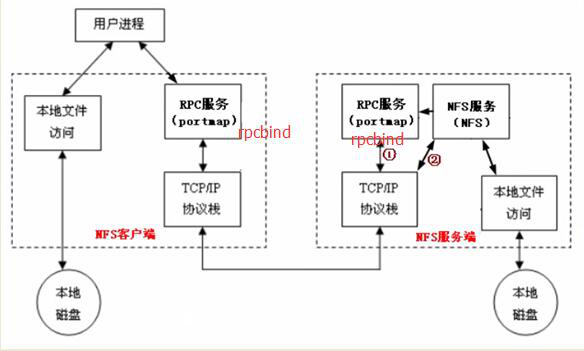本文主要对NFS服务进行介绍,以及如何安装NFS服务和NFS的配置选项。
NFS介绍
-
NFS是Network File System的缩写,分为2,3,4,三个版本,目前最新为4.1版本;
-
NFS数据传输基于RPC协议,RPC是Remote Procedure Call的简写;
-
NFS主要的应用场景为:A、B、C三台机器上需要保证被访问到的文件是一样的,A共享数据出来,B和C分别去挂载A共享的数据目录,从而B和C访问到的数据与A一致,架构如下图:

原理图如下:

NFS服务本身不会监听端口,而是由rpcbind服务监听111端口,在Centos6以前,rpcbind被称为portmap。
NFS服务安装与配置
NFS安装
-
搭建NFS服务,需要安装
nfs-utils和rpcbind这两个软件包,使用yum安装即可,同时在需要访问NFS服务的客户端上,同样也需要安装这两个软件包:yum install -y nfs-utils rpcbind
配置NFS服务端
-
在服务端,编辑
/etc/exports文件,写入需要被共享访问的目录路径和允许访问的ip地址或ip段:[root@localhost ~]# vi /etc/exports # 写入如下内容 /home/nfsdir 192.168.67.0/24(rw,sync,all_squash,anonuid=1000,anongid=1000) -
然后创建要共享的目录,并设置为777权限:
[root@localhost ~]# mkdir /home/nfsdir [root@localhost ~]# chmod 777 nfsdir/ -
查看rpcbind服务是否启动,如果没有启动,使用
systemctl start rpcbind启动服务:[root@localhost ~]# netstat -tlnp Active Internet connections (only servers) Proto Recv-Q Send-Q Local Address Foreign Address State PID/Program name tcp 0 0 0.0.0.0:22 0.0.0.0:* LISTEN 868/sshd tcp 0 0 127.0.0.1:25 0.0.0.0:* LISTEN 1320/master [root@localhost ~]# systemctl start rpcbind [root@localhost ~]# netstat -tlnp Active Internet connections (only servers) Proto Recv-Q Send-Q Local Address Foreign Address State PID/Program name tcp 0 0 0.0.0.0:111 0.0.0.0:* LISTEN 3389/rpcbind tcp 0 0 0.0.0.0:22 0.0.0.0:* LISTEN 868/sshd tcp 0 0 127.0.0.1:25 0.0.0.0:* LISTEN 1320/master tcp6 0 0 :::111 :::* LISTEN 3389/rpcbind tcp6 0 0 :::22 :::* LISTEN 868/sshd tcp6 0 0 ::1:25 :::* LISTEN 1320/master [root@localhost ~]# ps aux |grep rpc rpc 3389 0.0 0.2 65008 1044 ? Ss 00:10 0:00 /sbin/rpcbind -w root 3394 0.0 0.2 112724 972 pts/0 S+ 00:10 0:00 grep --color=auto rpc -
然后启动NFS服务:
systemctl start nfs[root@localhost ~]# ps aux | grep nfs root 3436 0.0 0.0 0 0 ? S< 00:13 0:00 [nfsd4_callbacks] root 3442 0.0 0.0 0 0 ? S 00:13 0:00 [nfsd] root 3443 0.0 0.0 0 0 ? S 00:13 0:00 [nfsd] root 3444 0.0 0.0 0 0 ? S 00:13 0:00 [nfsd] root 3445 0.0 0.0 0 0 ? S 00:13 0:00 [nfsd] root 3446 0.0 0.0 0 0 ? S 00:13 0:00 [nfsd] root 3447 0.0 0.0 0 0 ? S 00:13 0:00 [nfsd] root 3448 0.0 0.0 0 0 ? S 00:13 0:00 [nfsd] root 3449 0.0 0.0 0 0 ? S 00:13 0:00 [nfsd] #启动nfs服务后,会启动rpc关联服务 [root@localhost ~]# ps aux | grep rpc rpc 3381 0.0 0.2 64948 1420 ? Ss 00:13 0:00 /sbin/rpcbind -w rpcuser 3408 0.0 0.3 42364 1760 ? Ss 00:13 0:00 /usr/sbin/rpc.statd root 3409 0.0 0.0 0 0 ? S< 00:13 0:00 [rpciod] root 3412 0.0 0.0 19312 400 ? Ss 00:13 0:00 /usr/sbin/rpc.idmapd root 3416 0.0 0.1 42548 940 ? Ss 00:13 0:00 /usr/sbin/rpc.mountd root 3457 0.0 0.2 112664 968 pts/0 R+ 00:15 0:00 grep --color=auto rpc -
如果需要让NFS服务开机自启动,那么需要使用systemd进行设置:
systemctl enable rpcbind systemctl enable nfs
NFS配置选项
- 在
/etc/exports文件中,我们在IP地址段后面还写了一些配置选项,具体的选项含义如下:
| 配置项 | 作用 |
|---|---|
rw | 读写 |
ro | 只读 |
sync | 同步模式,内存数据实时写入磁盘 |
async | 非同步模式,能够保证磁盘效率,但断电时可能会丢失数据。 |
no_root_squash | 客户端挂载NFS共享目录后,root用户不受约束,权限很大 |
root_squash | 与上面的选项相对应,客户端上root用户收到约束,被限制为某个普通用户 |
all_squash | 客户端上所有的用户在使用NFS共享目录时都被限定为一个普通 |
anonuid/anongid | 与上面三个选项搭配使用,定义被限定用户的uid和gid |
NFS配置客户端
-
在NFS客户端上,使用命令
showmount -e [srcip]查看服务端共享的目录:[root@localhost ~]# showmount 192.168.67.128 clnt_create: RPC: Port mapper failure - Unable to receive: errno 113 (No route to host)产生报错,可能是服务端的服务未运行,也可能是防火墙或selinux导致端口未被放行,虽然rpcbind监听111端口,但nfs之间通信的端口是随机的,所以需要在服务端和客户端使用命令
systemctl stop firewalld关闭防火墙。 -
关闭防火墙之后重新执行
showmount命令:[root@localhost ~]# showmount -e 192.168.67.128 Export list for 192.168.67.128: /home/nfsdir 192.168.67.0/24可以看到,服务端共享的目录为
/home/nfsdir。 -
然后可以将共享目录挂载到本地:
mount -t nfs 192.168.67.128:/home/nfsdir /mnt挂载时需要使用
-t指定文件系统,然后使用ip:/path的形式指定被挂载的远程目录。 -
查看挂载:
[root@localhost ~]# df -h 文件系统 容量 已用 可用 已用% 挂载点 /dev/sda3 28G 1.2G 27G 5% / devtmpfs 227M 0 227M 0% /dev tmpfs 237M 0 237M 0% /dev/shm tmpfs 237M 4.5M 232M 2% /run tmpfs 237M 0 237M 0% /sys/fs/cgroup /dev/sda1 197M 109M 88M 56% /boot tmpfs 48M 0 48M 0% /run/user/0 192.168.67.128:/home/nfsdir 28G 5.3G 23G 19% /mnt
NFS使用
-
在客户端的挂载目录内,创建一个测试文件,并且查看其权限和属组、属主:
[root@localhost mnt]# touch test [root@localhost mnt]# ll 总用量 0 -rw-r--r--. 1 1000 1000 0 6月 22 00:43 test -
在服务端的共享目录中查看文件是否同步,以及权限、属组、属主信息:
[root@localhost ~]# cd /home/nfsdir/ [root@localhost nfsdir]# ll 总用量 0 -rw-r--r--. 1 mysql mysql 0 6月 22 00:43 test -
客户端和服务端上查看文件时,会发现属组和属主不同,这是因为我们设置了
anonuid和anongid为1000,所以在服务端和客户端上查看时,会显示为uid、gid为1000的本地用户:# 服务端查看uid为1000的用户,而客户端没有uid为1000的用户,所以会直接显示uid和gid为1000 [root@localhost nfsdir]# cat /etc/passwd | grep 1000 mysql:x:1000:1000::/home/mysql:/sbin/nologin
